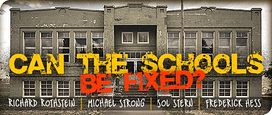Since Richard Rothstein has nothing to say about the criticisms I made in my last post, I see nothing useful in raising those points again. I would only note that he now takes his determinist view about the possibility of in-school reforms raising the achievement of disadvantaged children to new heights (or should I say to new lows). Consider this remarkable statement by Rothstein: “It is unreasonable and irresponsible to expect schools and teachers to overcome social class differences while exempting every other institution and public official from taking action to do so.”
No one is suggesting that schools “can overcome class differences.” However, what some of us in the school reform community do believe is that schools have not even come close to fulfilling their potential for improving outcomes for the disadvantaged. As I pointed out in my last post, there is a strong scientific consensus that the black-white gap in reading achievement in the early grades can be substantially narrowed with the use of programs that follow the protocols of scientifically based reading research. In the current issue of Education Week, E.D. Hirsch reiterates his long-held claim that, “there is still no definite, coherent academic curriculum in the early grades” and that this lack of content knowledge is the source of a significant part of the low achievement of American students. Until the schools start paying attention to what cognitive scientists have discovered about the best instructional methods for teaching reading and the need for a knowledge-based curriculum in the early grades, it is useless to speculate about how much of the academic achievement gap is produced by “social class differences.”

